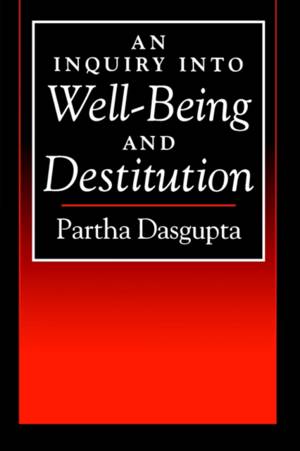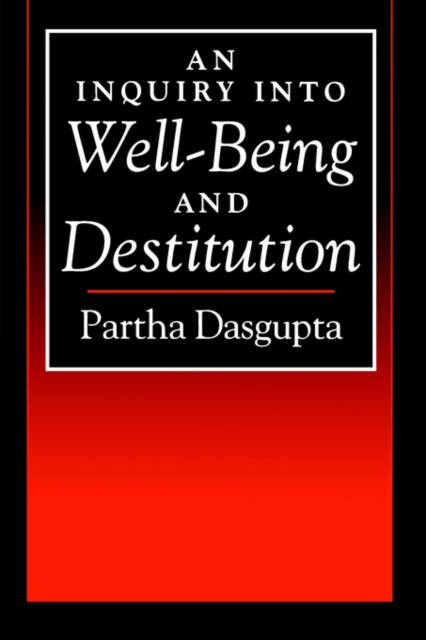
- Retrait gratuit dans votre magasin Club
- 7.000.000 titres dans notre catalogue
- Payer en toute sécurité
- Toujours un magasin près de chez vous
- Retrait gratuit dans votre magasin Club
- 7.000.0000 titres dans notre catalogue
- Payer en toute sécurité
- Toujours un magasin près de chez vous
84,45 €
+ 168 points
Description
How should economic and social theory accommodate empirical facts about physical destitution, and how should governments respond to famines and hunger? This interdisciplinary book focuses on these and other questions about physical being. Dasgupta's aim here is to offer a description of destitution as it occurs among rural populations of the poor countries of Asia, Africa, and Latin America; to give an account of the forces at work which perpetuate destitution, and to offer prescriptions for both the public and private spheres of life. A central concern of the author has been to reconcile theoretical considerations with the empirical evidence that has been obtained in the several disciplines this work encompasses, including anthropology, demography, ecology, geography, and philosophy. The entire discussion is designed to provide a philosophy for human well-being that can guide public policy in poor countries. Therefore, the role of the State, of communities, of households, and of individuals is studied in considerable detail. The author reveals an empirical link between greater political and civil liberties and improvements in life expectancy at birth, national income per capita, and infant survival rates. He identifies patterns of asset redistribution that promote economic growth by raising labor productivity, and argues that democratic participation in the design of public policies is not only intrinsically valuable, but has strong instrumental virtues: it allows privately held information to be put into effective use. Dasgupta presents evidence to show that significant reductions in military budgets would free the resources needed for the satisfaction of citizens' basic economic needs, and he provides guidance for the motivation and necessary focus of governments. He also looks at the allocation of food, work, health care, education, and income across genders, age groups, and orders of birth. He explores the findings of nutritionists on the link between food needs and work capacity, and develops a language to allow the environment to be included in social policies and calculations. By covering an unprecedented range of material, An Inquiry into Well-Being and Destitution becomes required reading for all those concerned with the human situation and the plight of the destitute.
Spécifications
Parties prenantes
- Auteur(s) :
- Editeur:
Contenu
- Nombre de pages :
- 680
- Langue:
- Anglais
Caractéristiques
- EAN:
- 9780198288350
- Date de parution :
- 24-08-95
- Format:
- Livre broché
- Format numérique:
- Trade paperback (VS)
- Dimensions :
- 154 mm x 237 mm
- Poids :
- 934 g

Les avis
Nous publions uniquement les avis qui respectent les conditions requises. Consultez nos conditions pour les avis.






